It’s no secret that effective time organization is a vital skill for employees and employers alike. But that’s not always enough. That’s why using the best time tracking software and learning time management skills should be a priority for your business. One powerful and fascinating way of learning helpful time management techniques, without additional stress, is through time management games.
Understanding Time Management Games: Benefits and Uses
If you notice the first signs of poor time management in your company – missed deadlines, lateness to meetings, poor performance – it’s time to take action! But, having your employees sit through another lecture on the ‘importance of timekeeping’ might not be the best idea.
Instead, why not switch up the game a little and turn learning discipline into fun time management activities? But before that, here are some basic tips:
- Make time tracking easy. The system should be easy enough for the average employee who has to fill the thing in every day.
- Everyone should be tracking hours.
- Do not force billing 8 hours a day. If you want a real picture of efficiency, make sure you create an environment where people are free to report honestly.
- Fill in hours regularly.
- Discuss the results, and give feedback.
- Track everything, not only project hours.
Completing timesheets takes involvement from the entire team. It is a journey, not a destination.
So, what are the best time management activities? Here are some examples:
- Offline games (Time Squared, solving jigsaw puzzles, The Big Picture Challenge, time jar)
- Online games (Overcooked, using Pomodoro timer, etc)
Benefits of Time Management Games
Self-education to improve time management skills after a hectic and task-packed day can help your employees learn useful new skills. And these time management games can be a perfect solution to unwind.
Did you know that time management games are an excellent tool for training the sensory nervous system, improving concentration, and critical thinking?
You can use them as:
- Team-building exercises
- Warm-up activities
- Ice-breakers
- Or, simply, as part of time management training
A range of time management games and techniques are freely available on the internet. They can be online and offline, group, or individual.
But to help you sort the wheat from the chaff and know which games genuinely work, we’ve gathered the best time management games and activities for you and your staff.
Why Do Games Work?
‘Gamification’ isn’t just a recent trend; it’s an innovative way of learning that has caught teachers’ and students’ attention.
Using interactive and fun ways of learning has numerous benefits. But these are our top favorites:
- Improves problem-solving skills – Taking on new challenges at a different level helps your brain grow and develop, allowing you to get more for your experiences.
- Relieves stress – Let’s face it, no matter how fantastic work is, it also involves a level of stress. While stress is an excellent motivator at times, knowing how to manage it is key to long-term success.
- Builds teamwork skills – Get to know your team better and have some fun. This creates better working relationships allowing your team to be more productive.
- Playing games is fun – All work and no play makes Jack a dull (and unproductive) boy. 65% of Americans play video games, so why not use this popularity and give it purpose.
- Improves learning retention – By actively engaging your employees in your time management games, you’re enhancing their capabilities for learning retention. Studies show active participation in learning improves how much information and skill a person retains from the training.
Best Offline Time Management Games for Productivity
Traditional offline time management games are best played in an office environment. They are designed for individual and team play and involve lots of human interaction – the more people, the more fun.
These games are great for understanding how to boost daily productivity and make better use of working time. And if you are looking for some extra tips on how to make yourself highly productive, follow the link.
The Big Picture Challenge
Teach your team to look beyond the immediate horizon in their work and plan for the future with the “Big Picture Challenge.” Inspired by Orangeworks.
- Divide your co-workers into small groups, each responsible for painting a small segment of The Big Picture
- With no idea what the final image will be, teams must work together to ensure that all lines meet and colors match up.
- The painted image can be a representation of a company’s brand, conference theme, values, goals, or even a recreation of a famous work of art.
- Upon completion, the final masterpiece is unveiled for the first time to the inevitable sound of thundering applause and enthusiastic cheers.
- The completed work can be proudly displayed in the office as a constant reminder of what can be achieved through teamwork.
Teams must adopt a ‘big picture’ approach to ensure that the final result is a success. This creative team bonding exercise requires effective color coordination and collaborative teamwork is required for each canvas to fit perfectly.
And BTW, here is the best software tools to help your colleagues plan effectively.
Circadian Rhythm
Teach your team to synchronize their work with their body clock with the “Circadian Rhythm” game.
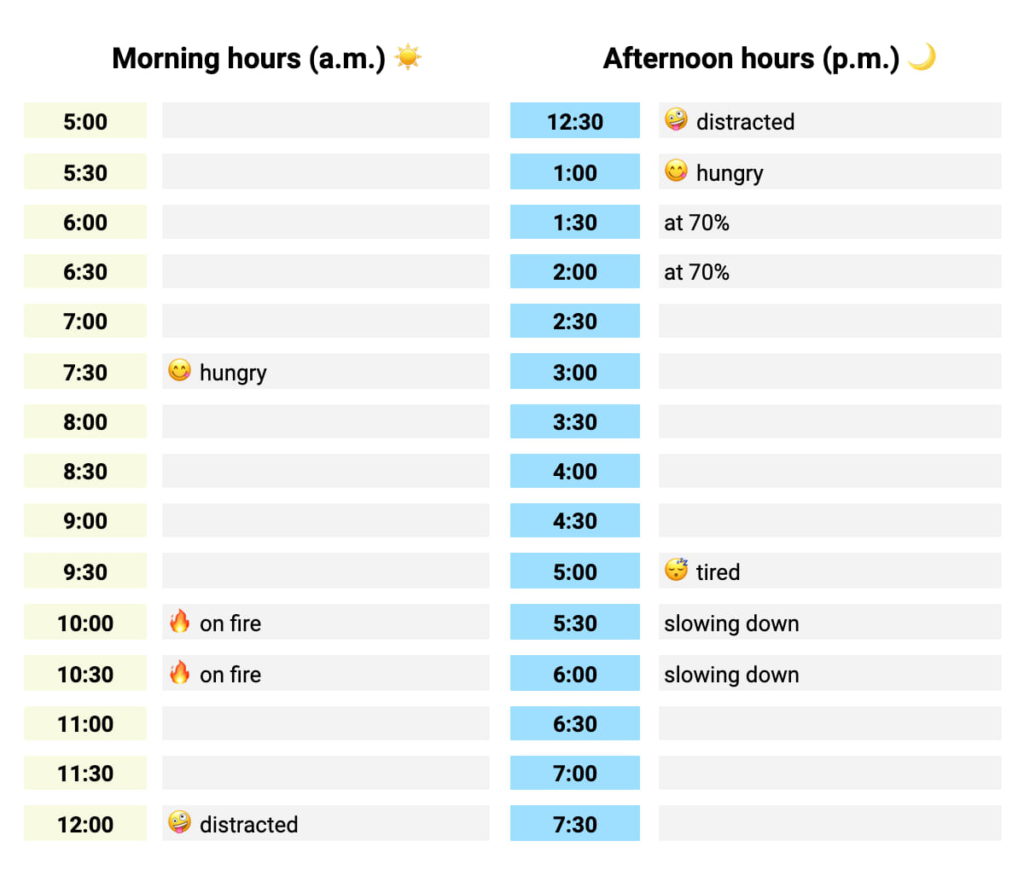
- Ask each player to jot down their daily routine in hours. Starting from waking up to going to bed
- Each participant should label each block with the following features: ‘on fire,’ ‘vibrant,’ ‘cruise control,’ ‘at 70%’, ‘distracted,’ ‘slowing down,’ ‘tired,’ ‘hungry’ indicating how they felt during the activity they were doing.
- Ask the participants to connect their hourly blocks to time management at the workplace and discuss the following points.
Points to discuss:
- What is the most active part of your day ‘on fire’?
- What is the most ‘distracted’ part of the day?
- During which part of the day is it better to complete the hardest/most manageable tasks?
- When is it best to take a break?
- Who has similar working/ relaxing rhythms in your team?
Wrap-up:
If the participants share their rhythms with each other, they could build an efficient working schedule for the whole team. It’s also an excellent opportunity to get to know teammates better and boost communication skills at the same time.
Another effective way for your colleagues to control their working time and breaks is to use the Pomodoro technique. It’ll help avoid overburdening and quick-burning out with time work periods and relaxation intervals.
Time Squared
Show your colleagues how they allocate their time throughout the day by playing the “Time Squared” game.
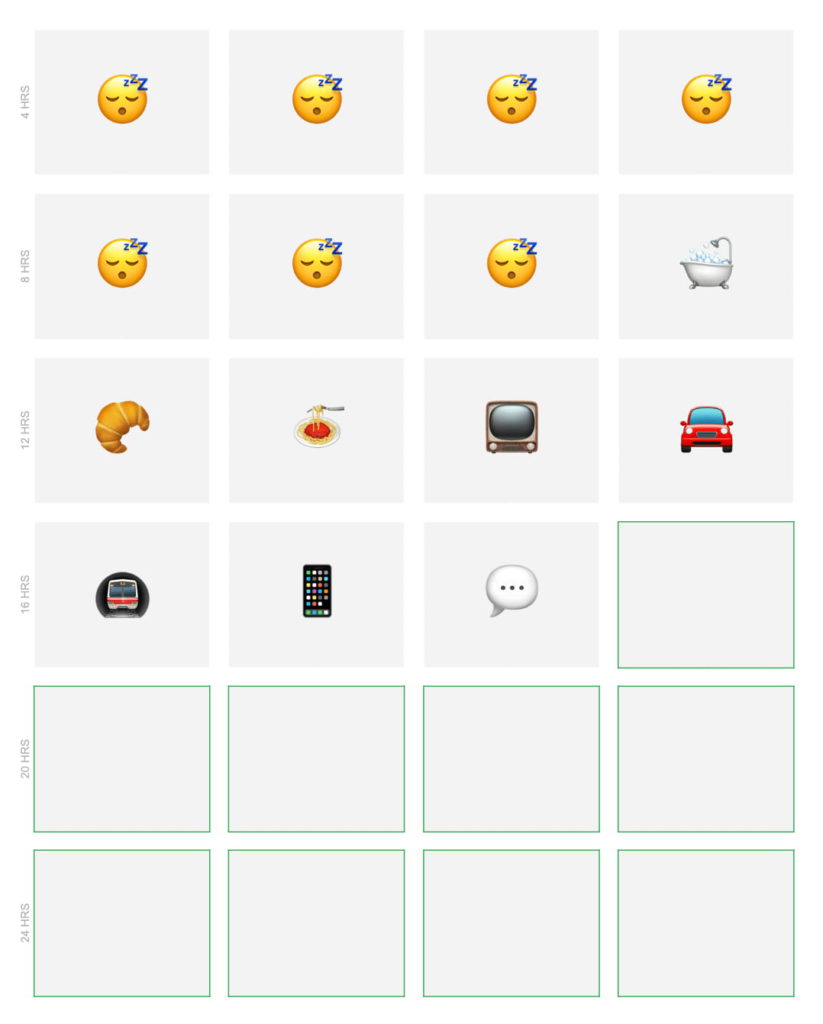
- Print 3 pages with 24 squares that represent the 24 hours of a day.
- Share the 1st page with the participants
- Explain that each square represents one hour of a day
- Ask them to fill out the squares with their routine activities. E.g. eating 4 hours = 4 squares, sleeping 7 hours = 7 squares, etc.
- Share the 2nd page with the participants
- Ask them to fill out the squares on the second page with the non-working time they spend at their workplace. E.g., coffee breaks, talk shops, calls to mom, checking social networks, etc.
- Share the 3rd page with the participants
- Ask them to summarize the data from the 1st and 2nd pages on the 3rd page. Use different colors to tell them apart. e.g., green for the 1st page, blue for the 2nd, red for the 3rd.
- Explain to your colleagues that the uncolored squares = ‘productive time.’
The task can be done throughout the day, so that your co-workers have more precise results on their papers, allowing them to evaluate time efficiently.
Points to discuss:
- How could you re-evaluate your time?
- Would you change anything in your statistics?
- Are there any steps you could take to increase your productive time?
- How would you rearrange your time to have some extra time for rest?
Wrap-up:
This game is a convenient way to actually see on paper how time is spent throughout the day. Afterward, ask your colleagues to find new ways to improve their time management. One great place to start is with some time management literature.
Delegation Skill Practice
Teach your colleagues to delegate tasks effectively with the “Delegation Skill Practice” exercise.
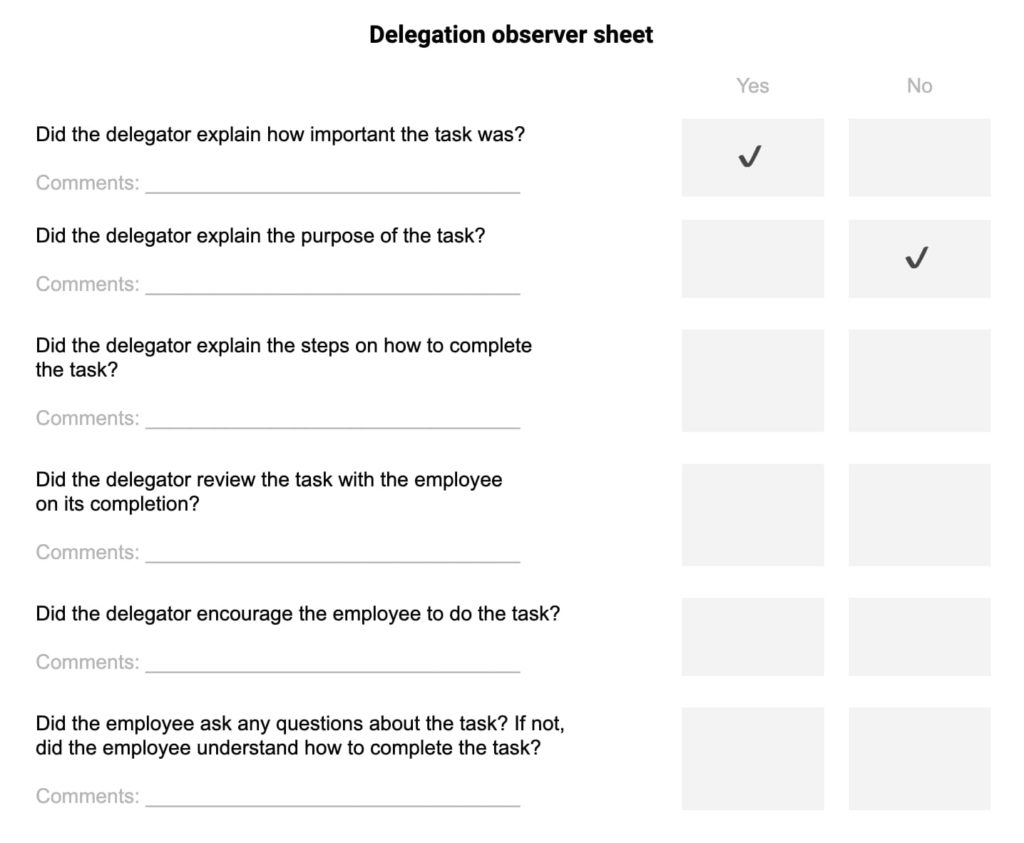
- Ask your colleagues to think of the most unpleasant task that they have to do in their work. Tell them that today they’ll have the chance to delegate it to someone else
- Ask them to think about how they would explain their unpleasant tasks to their personal assistants, how they would check that the task is done, and how they would encourage their personal assistants to complete the task
- Divide your colleagues into teams of 3: delegator, employee, observer
- Share the delegation observer sheet with delegators to help check how well the delegator explains the task
- Share notes sheet with employees to make notes while the delegator explains the task
- After the delegator explains the task, the employee jots the task down, and the observer checks the points in the delegation observer sheet. Allow some time for the team to discuss the results
- Change the roles in teams and repeat the task. The game has 3 rounds so that every participant tries every role
- Discuss the activity with your team.
Points to discuss:
- Which task is the most unpleasant in the team? What was the most challenging/easiest part of the task?
- Who is the best delegator on the team?
- Who is the ‘best employee’ in the team?
- Which part of the game was the most difficult?
- Which role was the most difficult?
- What could you do to improve the delegators/employees’ performance for each participant?
Wrap-up:
Knowing how to delegate tasks is an essential skill for any manager. It optimizes time spent and helps ensure the best person for the job is assigned to it, whenever possible.
To help better manage your team, and allocate time more efficiently, check out the techniques and strategies we’ve come up with here.
What I Did Yesterday
Teach your team how to find patterns in everyday working activities with the “What I did yesterday” game.
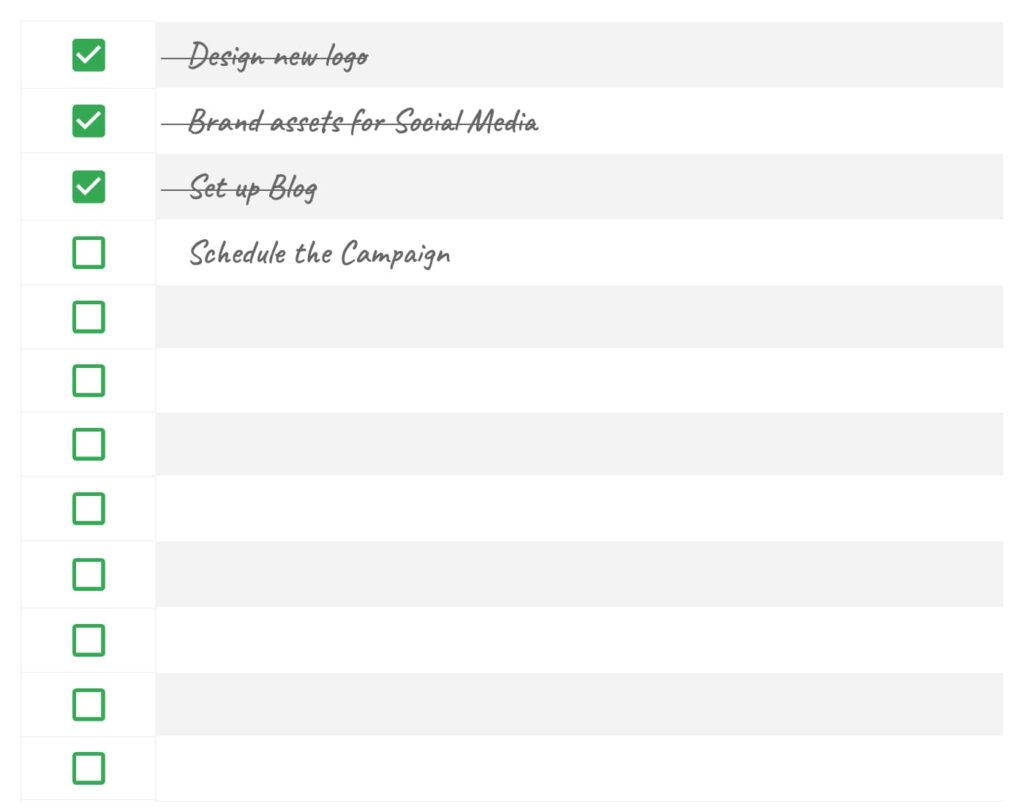
- Ask participants to note down 10 things they did at work yesterday on one piece of paper
- On the second piece of paper ask the participants to note down 5 things they expect to discuss at their next performance review
- Now, have them look at the two lists together and mark in some way on the first list all the things which have a direct link to the second list.
Wrap-up:
The ‘light bulb’ moment is the recognition that we spend time on things that have little or no consequence on our performance. Using this activity, participants can adjust the expectations of their daily schedule and become more efficient. This will help them accept an appropriate amount of work, prioritize, and be able to give a clearer deadline. Leading to a more prosperous, efficient company.
The Mayo Jar Lesson
The mayo jar activity demonstrates the importance of doing the most important tasks first.
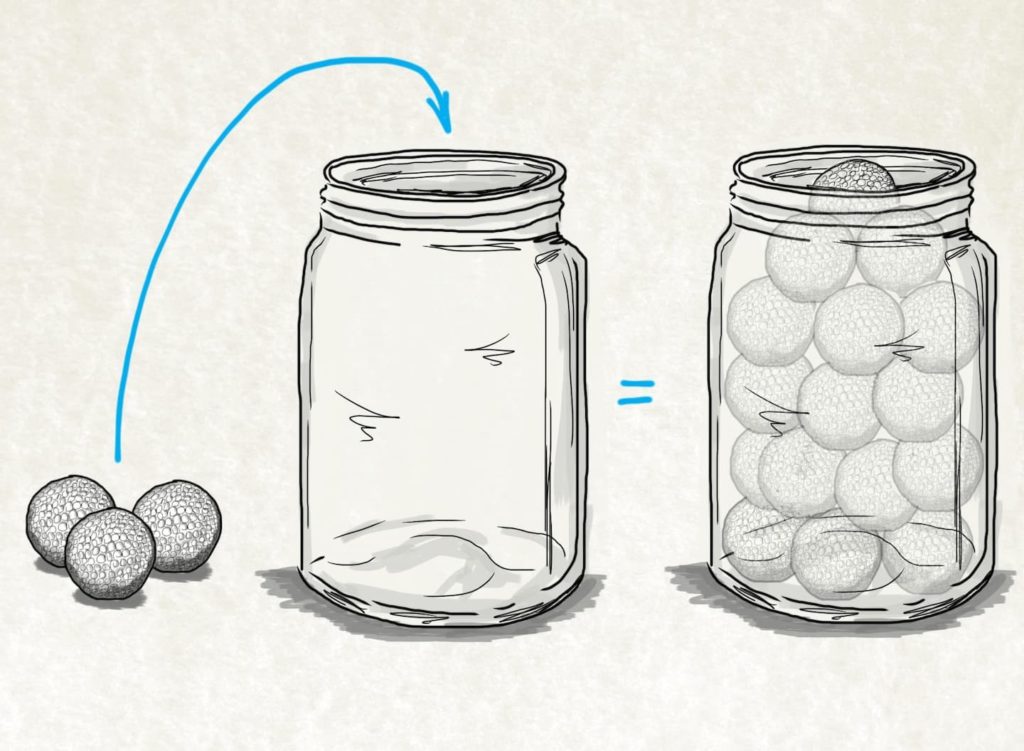
As the story goes a professor stands before his philosophy class with an empty jar, fills it to the top with golf balls, and asks if it’s full. The group says “yes.” Yet he still manages to fill the jar with more stuff — first pebbles, then sand, even a beer or two!
It’s a powerful lesson. Depending on which objects you put in first determines how many other items you can put in afterward. If you put sand in first, nothing else will fit (except some water), but if you start with the big rocks (our most important tasks) and go down, you can fit some of everything in.
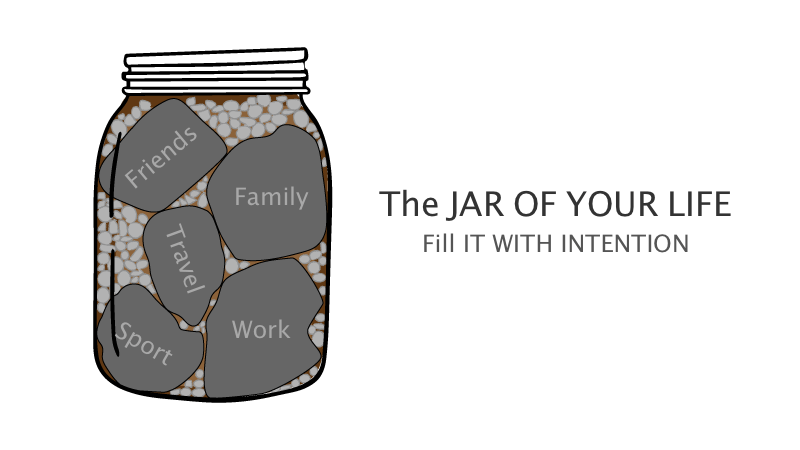
This jar represents your life. The rocks are the important things – your family, your partner, your health, your work – things that if everything else was lost and only they remained, your life would still be full. The pebbles are the other things that matter – your house, your car. The sand is everything else, the small stuff.
How will you manage your time jar?
If you put the sand into the jar first, there is no room for the pebbles or the rocks. The same goes for your life. If you spend all your time and energy on the small stuff, you will never have room for the things that are important to you. Pay attention to the things that are critical to your happiness. Play with your children. There will always be time to clean the house, throw a dinner party, or fix the disposal.
$86,400
Emphasize the importance of time and you are in control of how you spend it. Time is about making the right choices.
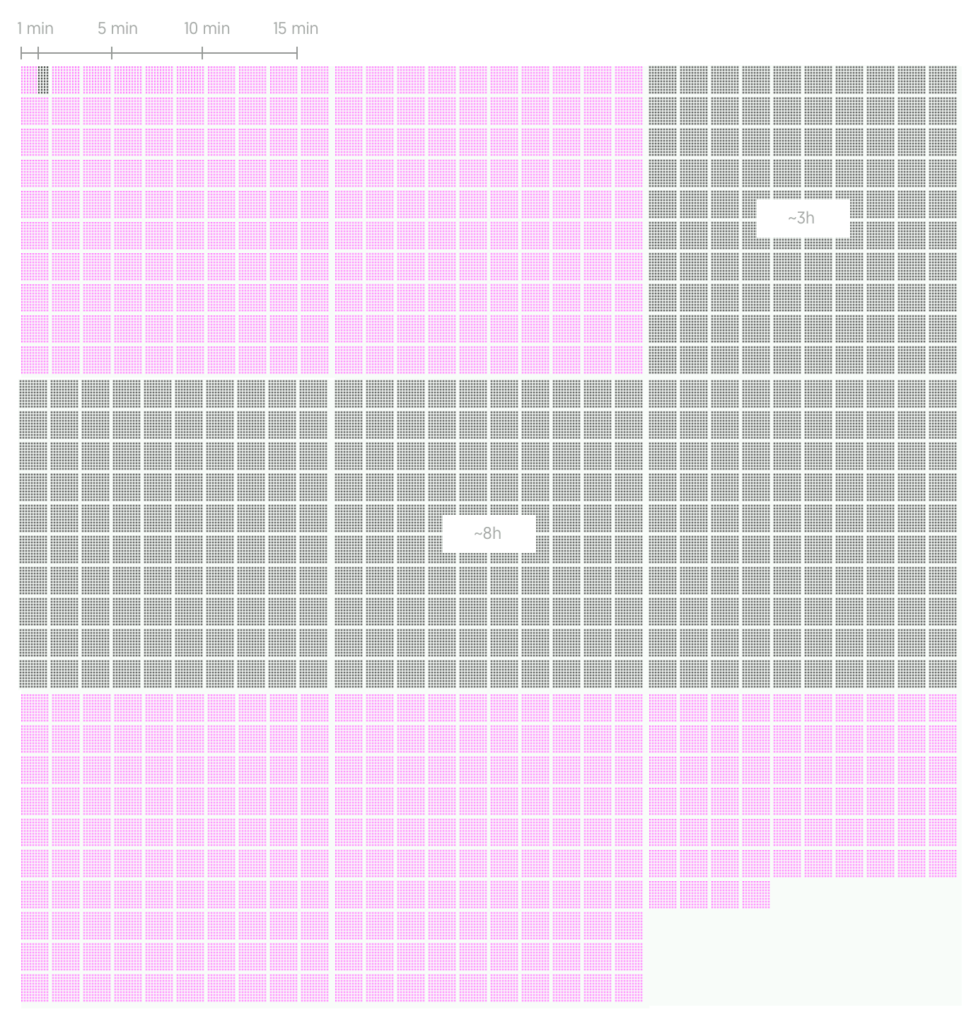
Imagine there is a bank account that credits your account each morning with $86,400. It carries over no balance from day to day. Every evening the bank deletes whatever part of the balance you failed to use during the day. What would you do? Draw out every cent, of course?
The Bank of TIME
Each of us has such a bank. Its name is TIME. Every morning, it credits you with 86,400 seconds. Every night it is written off as lost, whatever of this you have failed to invest. It carries over no balance from the day before. It allows no overdrafts. Each day it opens a new account for you. Each night it burns what remains of the day.
- To realize the value of ONE YEAR. ask a student who failed a grade.
- To realize the value of ONE MONTH, ask a mother who has given birth to a premature baby.
- To realize the value of ONE WEEK, ask the editor of a weekly newspaper.
- To realize the value of ONE HOUR, ask the lovers who are waiting to meet.
- To realize the value of ONE MINUTE, ask a person who just missed a train.
- To realize the value of ONE SECOND. ask someone who narrowly avoided an accident.
Credit to The Coaching Toolbox.
Ribbon of Life
For this time management exercise, you need a ribbon with a length of 100cm (1 meter) and a pair of scissors.
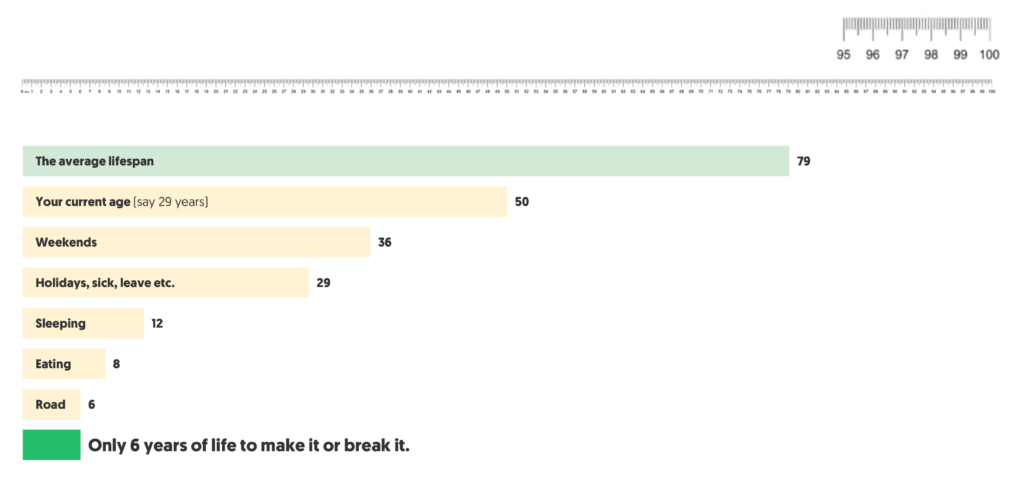
Ask your team: What is the estimated lifespan of an individual?
The normal response will be between 75 and 85 years. Let’s say it’s 79. So you need to cut 21cm off your ribbon. It is now 79cm long, meaning we have 79 years left.
What is the average age of the participants?
This depends on the group you’re doing this exercise with. But let’s say the number you get is 29, so you chop another 29cm of your ribbon. These years are what you would call “sunk costs”, you can’t do anything about them. The ribbon now has 50cm.
So we have 50 years left? The actual answer is no.
You still need to factor in a lot of variables: weekends, public holidays, casual/sick leave, and annual holidays. Every year has 52 weeks, so that’s 52 Sundays per year. Multiply that by 50 years (the current length of our ribbon) and you get 7.14. Reduce the ribbon by 7cm. The same logic applies to Saturdays. Reduce another 7cm. The ribbon now has 36cm.
36 cm minus holidays and leave
There are 10 Public/National holidays per year, which gives us 1.5 years when multiplied by 50. Reduce the ribbon by 1.5 cm. Plus we spend approximately 40 days a year on casual leave, sick leave, and annual holidays. That’s around 5 years, so you cut off another 5 cm. The ribbon now has 29.5cm.
29 cm and counting…
But we still need to take into account sleeping, eating, and commuting. We spend a third of our day (and so a third of our year) sleeping. Considering an average of 8 hours of sleep per day, we get 122 * 50 = almost 17 years. Cut off another 17 cm. The ribbon now has 12.5 cm.
You need around 2 hours per day to eat lunch, breakfast, snacks, and dinner. 30 days a year X 50 years= 4 years or so. Cut off another 4 cm. The ribbon now has 8.5cm.
Lastly, let’s factor in commuting and time spent traveling from one place to another for activities. If we average one hour a day, that’s 2 more years. The ribbon now has 6.5cm.
In fact, when all is said and done, there are ONLY 6 years of life to make it or break it!
Credit to Daniel Silvestre.
How Long is a Minute?
In this simple yet effective game, participants are invited into a room devoid of visible clocks, and are instructed to set aside their phones and watches. With their eyes closed, everyone stands up and attempts to gauge when exactly 60 seconds have passed. Some may open their eyes too early, others too late, revealing individual differences in time perception.
The game serves a dual purpose: it’s both a fun challenge and a learning opportunity. By experiencing firsthand how differently each person perceives the passage of time, participants gain insights into their own time management skills. Understanding these differences can lead to more accurate project planning and task estimation in professional settings.
Great for:
- Recognizing the importance of time and comparing personal time perception with that of colleagues.
- Enhancing self-awareness about task time estimation.
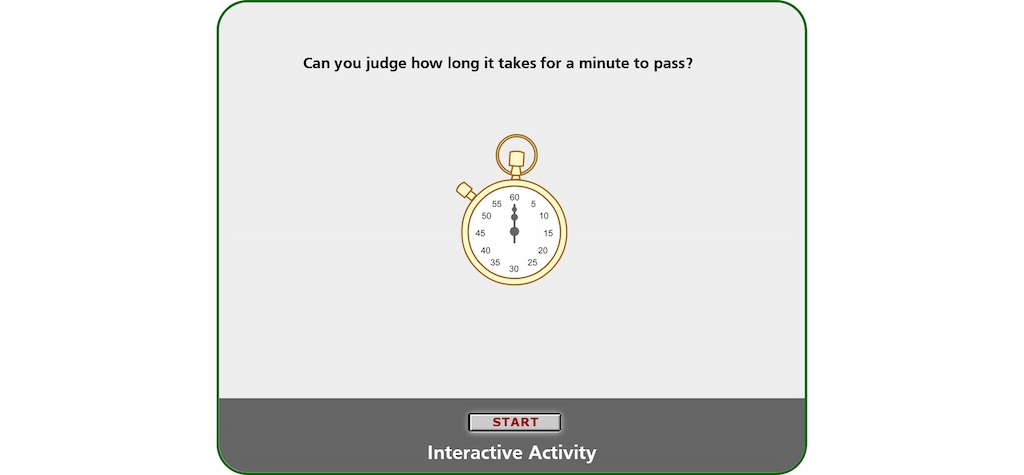
Desert Island
Imagine being stranded on a desert island with limited resources and having to prioritize what items are essential for survival. In this game, participants are tasked with quickly jotting down the items they would bring to a desert island within a time limit. Afterward, the group discusses each item and collectively assigns points based on its perceived importance and usefulness in a survival scenario.
This game not only tests participants’ ability to think critically and make decisions under pressure but also highlights the importance of prioritization and resource management. It encourages teams to consider different perspectives and negotiate priorities, fostering teamwork and mutual understanding.
Great for:
- Teaching the team how to prioritize tasks effectively.
- Encouraging quick and efficient decision-making skills.
- Highlighting the importance of focusing on essential tasks and avoiding distractions.

Top Online Time Management Games to Improve Focus
Time is an essential and widely-used value in any video game. If you’ve ever played against the clock, you’ll know that even in the game environment, it can be stressful.
But there is an upside. Playing games with timers means you’re already on the way to developing essential time perception skills. But instead of ‘wasting’ your time with a shoot-’em-up, why not try out the specific category of games designed especially for time management skills improvement – time management games? And make playtime productivity time?
Let’s take a look at some popular online time management games.
Overcooked!
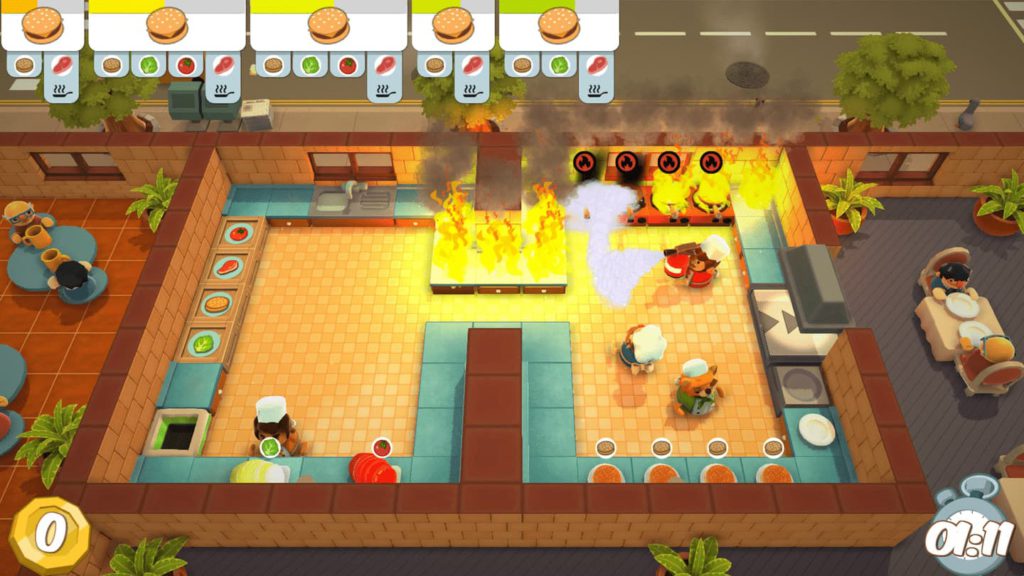
Overcooked! is a restaurant time management game. The idea behind the game is to serve various food to your customers, try to keep them happy, and cook everything in absurdly stressful conditions – like a hot air balloon or in the middle of the street. Sounds like a normal day at the office, right? The game offers lots of obstacles to overcome, a diversity of cooking recipes, and lots of fun, especially in multiplayer mode.
Time management skills trained:
- Delegation and team-coordination skills by ordering and organizing the cooking process
- Rapid decision-making by dealing with portals, fires, moving floors, and changes in settings
- Dealing with time-pressure skills as every level is time-limited
- Team-work in multiplayer mode
What to discuss with your team:
- How did it feel to be under pressure in the kitchen?
- How did you learn to manage the process?
- What would you do differently?
Game Dev Story
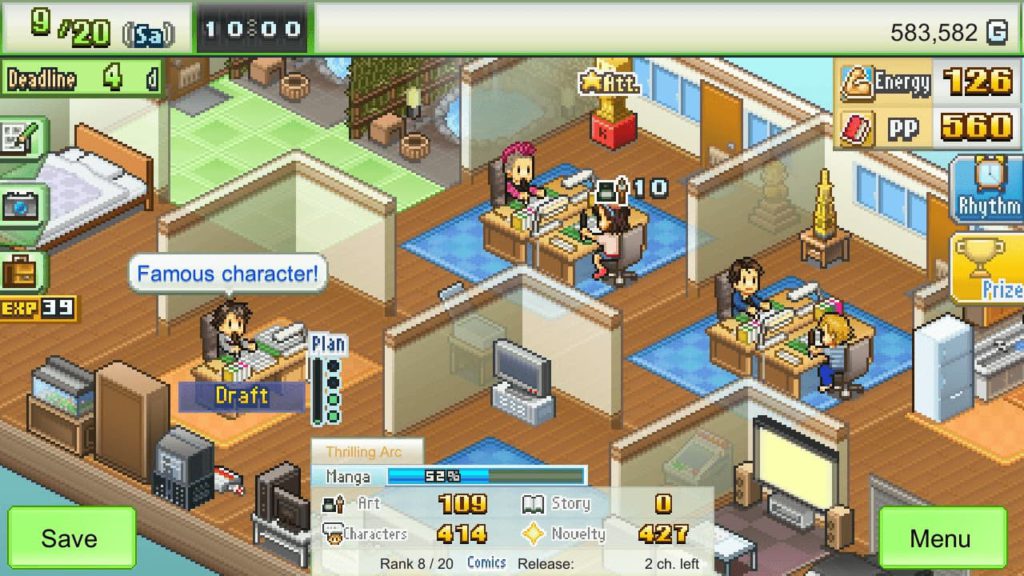
You play as a video game developer making hit video games and brand-new consoles in start-up projects. To be a success and keep things afloat, you need to hire and manage your own team, control the process of game development, and deal with the critics.
Time management skills trained:
- Leadership skills, which you learn by controlling your workers’ speed and quality development as well as hiring the right people
- Business skills of money-making by selling and advertising the products
What to discuss with your team:
- What are the best strategies for making more money in the game?
- What professionals should you hire first of all to manage your company effectively?
- How to better allocate the company’s budget in the game?
Farm Frenzy 3
Farm Frenzy 3 immerses players in the role of a farmer managing a bustling farm. It’s a time management game that involves animal care, crop cultivation, and business development.
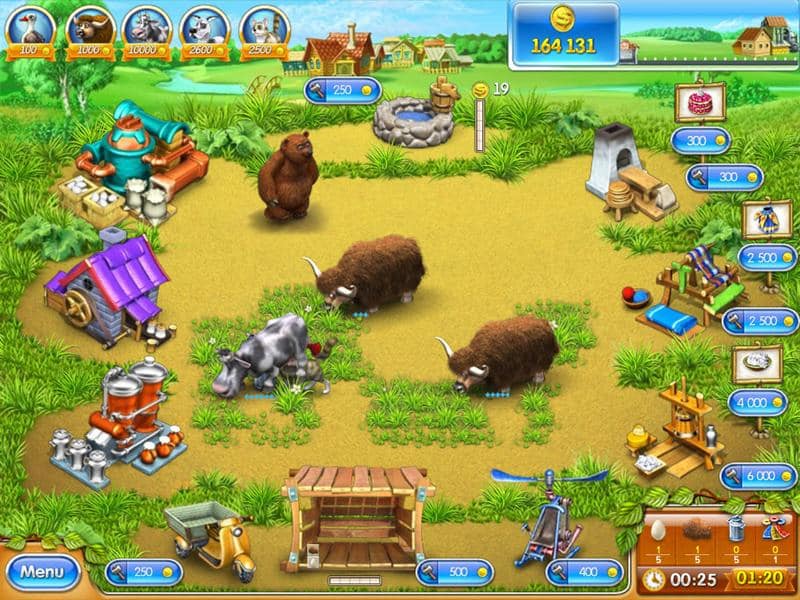
Time management skills trained:
- Crop and animal management
- Production optimization and supply chain logistics
- Financial planning and investment in farm upgrades
- Risk management and resilience against challenges
What to discuss with your team:
- Strategies for maximizing crop yield and animal productivity
- Approaches to handling seasonal fluctuations and market demands
- Lessons learned in prioritizing tasks and managing farm resources
Theme Hotel
Theme Hotel challenges players to build and manage a 5-star hotel from the ground up. It emphasizes strategic planning, customer service, and business expansion in a competitive market.
Time management skills trained:
- Facility layout and design optimization
- Staff recruitment and management
- Financial planning and budgeting
- Customer satisfaction and retention strategies
What to discuss with your team:
- Techniques for designing an efficient hotel layout
- Insights on maintaining high customer ratings and occupancy
- Challenges and solutions in managing staff and resources
Farmerama
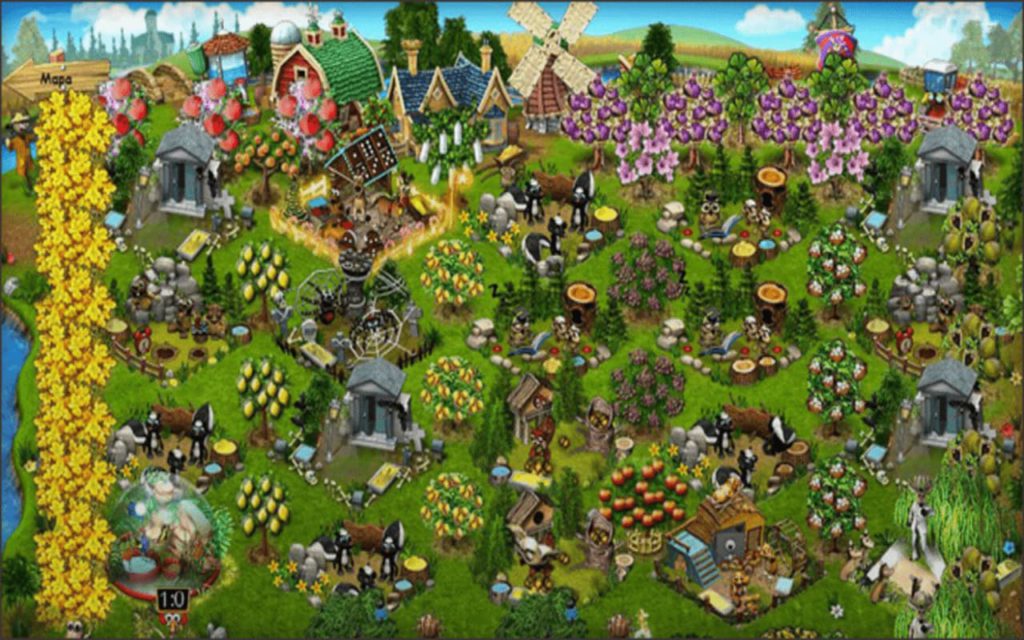
In Farmerama, you have your own farm where you grow your harvest, take care of the animals, and come under fire from alien attacks that happen out of the blue.
Time management skills trained:
- Planning skills by planting and caring about your harvest
- Marketing skills by selling and buying plants and animals
- Teamwork skills by participating in various farming communities
What to discuss with your team:
- Which steps should you take to develop your farm effectively?
- What should you do to gather the largest crop?
- Did you communicate with other players? Why/why not?
- Did you have similar objectives with other players? Did you collaborate with them? Why/why not?
12 labors of Hercules
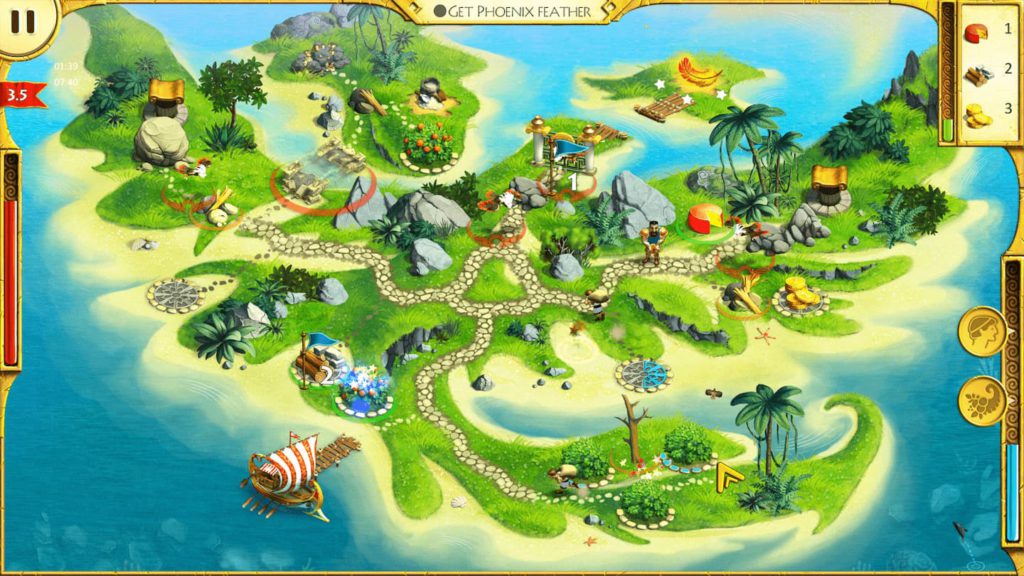
You’ll play as Hercules, who has to complete his 12 Labours in order to rescue his wife from Hades’ Underworld. The game has a definite time limit, so you’ll have to find ways to stop it while completing various tasks.
Time management skills trained:
- Timing skills, as you’ll have to meet deadlines to collect all the stars
- Critical thinking and logic as you’ll need to think about in which order and how complete the tasks
- Rapid decision-making through dealing with ghosts, lava pits, and monsters.
- Organization skills by using the skills of companions, such as Medusa, Pegasus, Cerberus, and others
What to discuss with your team:
- How did you feel when completing tasks in a limited time?
- Were the game tasks easy or challenging to do?
- Have you tried all the modes of the game? Which mode suits you best?
Diner Dash Adventures
Diner Dash Adventures puts you in the shoes of Flo, managing a bustling restaurant in DinerTown. It’s a classic time management game where you seat customers, take orders, and serve food to keep your restaurant thriving.
Time management skills trained:
- Customer service and satisfaction
- Task prioritization and efficiency
- Resource management (such as tables, food supplies)
- Speed and accuracy in multitasking
What to discuss with your team:
- Strategies for optimizing customer flow and satisfaction
- Techniques for handling peak times and difficult customers
- How to balance speed and accuracy in completing tasks
Sally’s Spa
In Sally’s Spa, you manage a spa business by providing various treatments to customers, hiring staff, and expanding services. It’s a time management game that focuses on customer satisfaction and business growth.
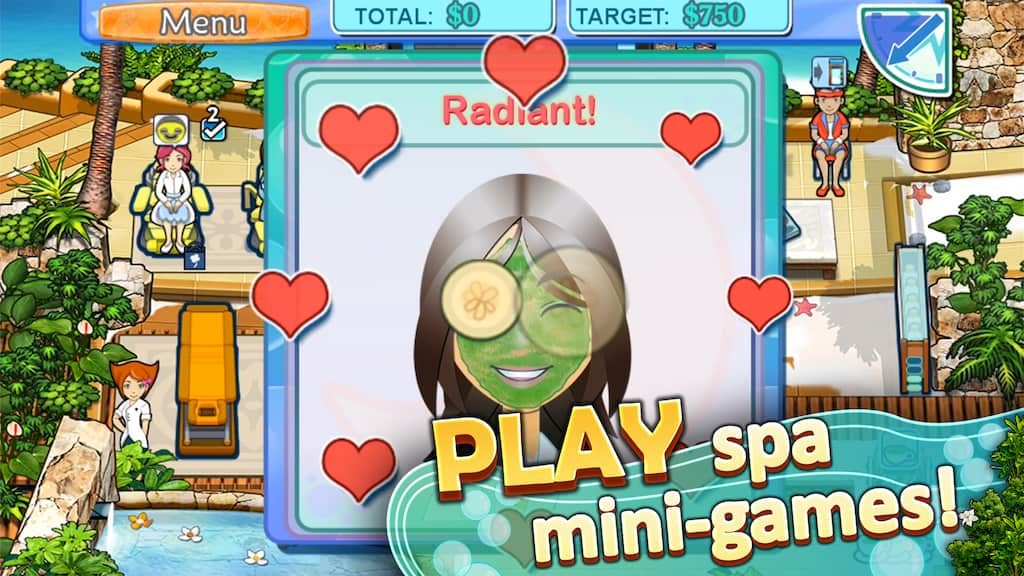
Time management skills trained:
- Service coordination and efficiency
- Staff management and delegation
- Inventory management and purchasing decisions
- Adaptability to varying customer demands and personalities
What to discuss with your team:
- Methods for improving service quality and customer satisfaction scores
- Challenges and solutions in managing multiple spa stations
- Insights on hiring and training staff effectively
Fabulous — Angela’s Fashion Fever
Fabulous — Angela’s Fashion Fever follows Angela’s journey in the fashion industry, where players manage a boutique. It’s a time management game focused on fashion design, customer service, and business success.
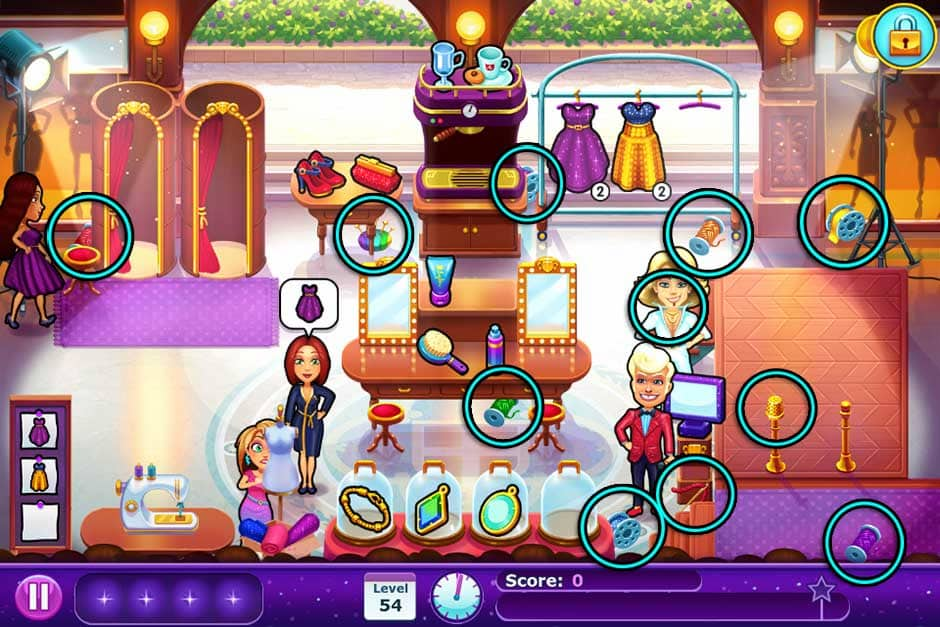
Time management skills trained:
- Customer relationship management
- Inventory management and product placement
- Time-sensitive task completion for score optimization
- Creative problem-solving in a fast-paced environment
What to discuss with your team:
- Techniques for enhancing customer shopping experiences
- Strategies for improving boutique performance and profitability
- Insights on managing fashion trends and seasonal demands
Plague Inc.
In this popular strategy game, you’ll join the dark side and play for the team of viruses and diseases, trying to contaminate as much territory as possible. The world scientific community will oppose you, developing effective medicine against you. Will you succeed in your evil task?
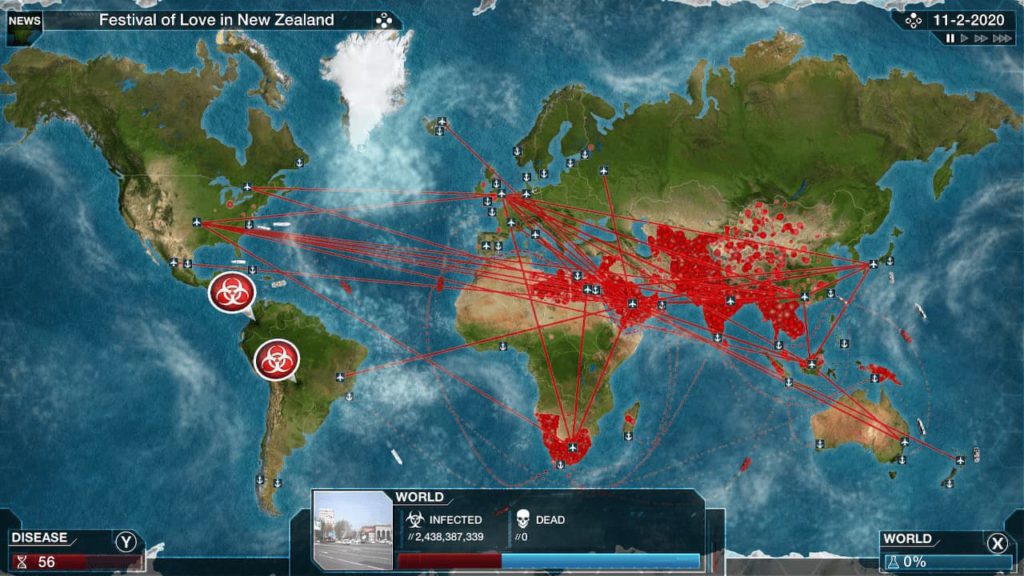
Time management skills trained:
- Timekeeping skills through fighting with scientists in the attempts to contaminate vast territories of the Earth
- Critical thinking, logic, and decision making as you’ll have to choose the most effective suffer viruses in line with the points earned
What to discuss with your team:
- How did you feel playing for the dark side?
- Did you develop any particular strategies for contamination to win the game?
- What do you think about the game’s timing?
- What was the hardest part of the game?
Remember! Be careful not to lose too much time while playing games.
Time Management Games Wrap-up
Time management games are a truly great way to train those important organizational skills. They use non-formal education methods to train your brain to react to time differently.
Available both online and offline and as individual and team activities, you’ll be sure to find one that suits you. To help you decide quickly which to try first. Here’s a breakdown:
Offline Games
Best suited for playing in the office. They help learn your strong and weak points as well as get to know your colleagues better and strengthen relationships with them.
Online Games
Great for improving your cognitive functions, such as attention, reaction, prioritizing, logic, and critical thinking. Besides, online games are excellent tools for developing time-tracking, organizational, and general business skills.
Bonus: From Games to Real Life: Time Management With Everhour
Now that you’ve had some fun trying out these time management games and activities, it’s time to get down to business.
Are you looking to improve time management practices in your company? We’d like to help you choose the best timesheet app, tailored for your business needs and corporate culture.
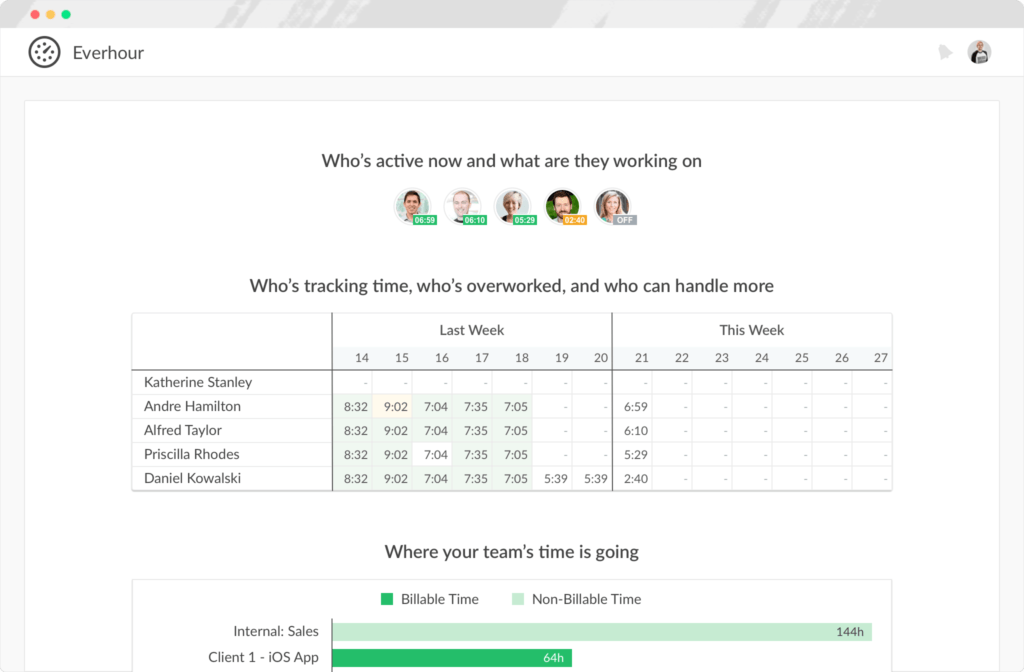
Seamless time management solution by Everhour
Everhour’s online time management solution is a simple, efficient, and handy tool. With Everhour’s Chrome time tracking you’ll be able to:
- Track project deadlines and monitor budgets
- Keep tracking of working time for teams and employees via employee time tracking tools
- Track employees’ workloads and assignments via an attendance tracker and a time clock app
- Plan your resources by viewing project portfolios and teams
- Send timely invoices based on time tracked and expenses
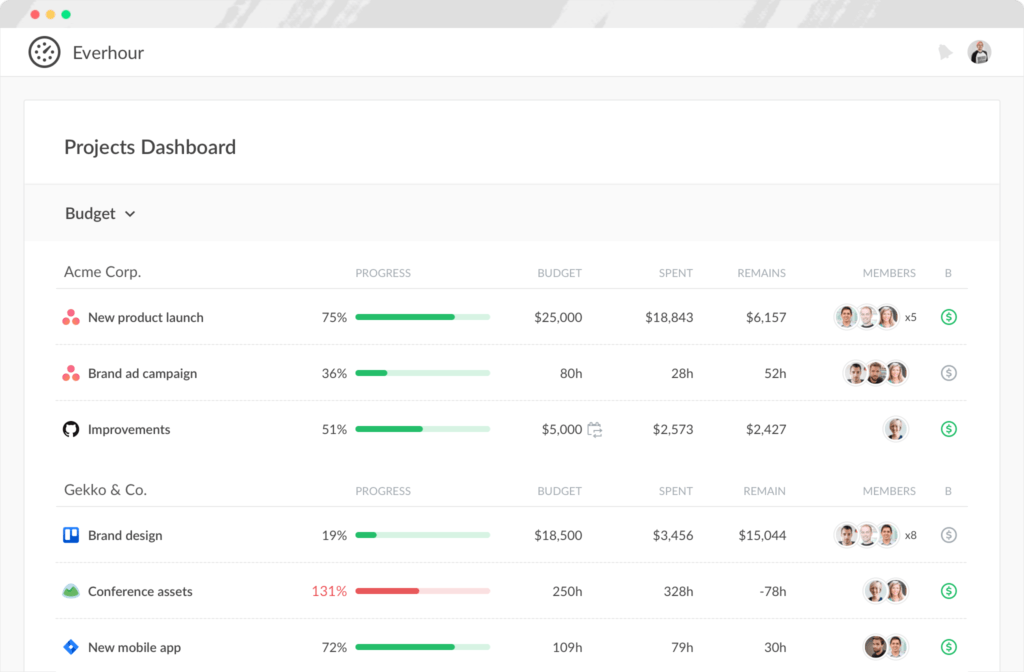
Everhour provides a seamless time-tracking experience as it is one of the best time and attendance software out there. It can be easily integrated into other project-management apps, such as Asana, Trello, Basecamp, Jira, and more, allowing you to manage your projects and time without switching back and forth between tabs. It uses the best time tracking practices to ensure not a single minute gets lost.
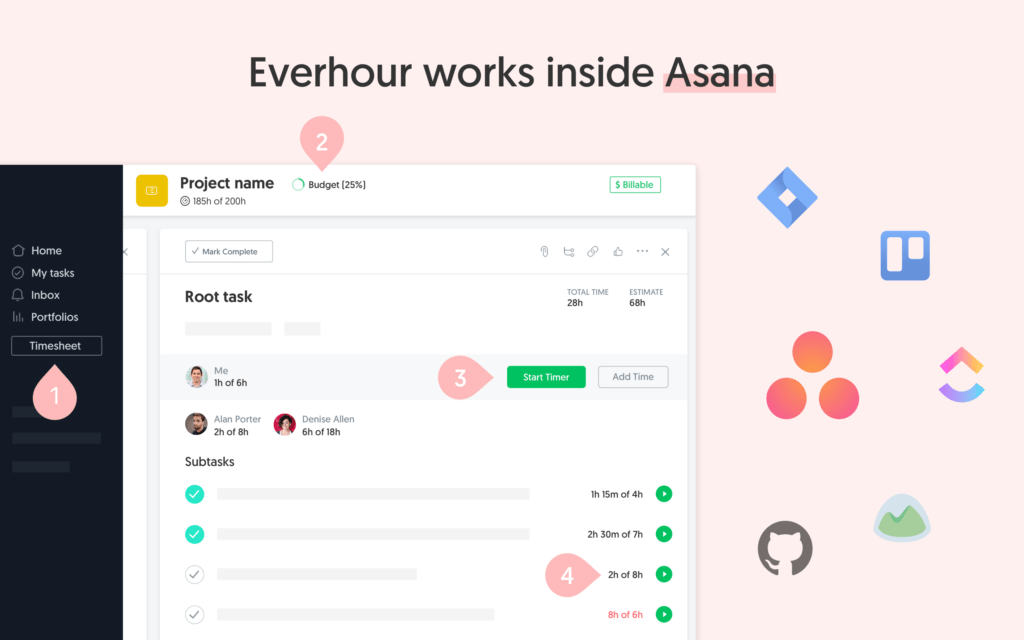
Pros of Everhour for your business
With Everhour you can forget about:
- Manual project setup – automatically important your projects and track time
- Switching between apps for logging time – it’s all integrated into one seamless system
- Wrong data, faulty timesheets – maintain accuracy and get real statistics about how you’re spending your time.
Try our demo for free to explore how our time tracking software can optimize your business, or get in touch with our team who’ll be happy to answer any questions you might have.
If you want to keep fun coming, check out our collections of memes: the top timesheet memes, working from home memes, and night shift memes to keep you safe!
If you are managing a team of 5 or more and looking to boost efficiency, Everhour is the perfect tool to keep your team on track. With seamless time tracking, you can easily estimate task durations, set clear budgets, and generate detailed reports inside Asana, Trello, Jira, or any other pm tool.
Humor can make complex topics more relatable, and that’s exactly where taxes memes come in, offering a lighthearted way to engage with otherwise dry subjects.

